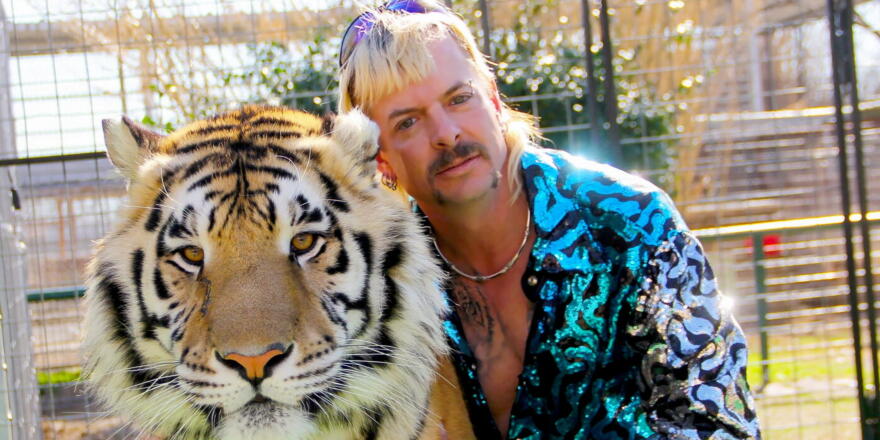By Fabia Morger
Oh, to be young again! There are some university courses I’d retake in a heartbeat if I had the chance. One of them is the Bachelor-level class “Language Skills and Culture II” of our English department. Attending the classes was pure enjoyment for me: it gave me a chance to re-watch so many of my favorite movies from a more theoretical angle and gain a deeper understanding of the cultures that had shaped them. One text that stayed in my mind even years later, is Warren Buckland’s “The Non-Fiction Film: Five Types of Documentaries”. It was this text that made me aware of how documentaries are not an objective record of real events and how choices made by documentary filmmakers shape the way we look at the events presented to us, even if they are supposedly non-fiction. And, boy, what movie better showcases this than the legendarily popular documentary series Tiger King?
The movie follows a group of exotic zoo/pet owners over the course of several years, with the focus being on Joe Exotic, self-proclaimed Tiger King, and his feud with animal rights activist Carol Baskin. Throughout the series, unethical treatment of animals is rampant: we see newborn cubs being torn away from their mothers, handed around for the amusement of the zoo visitors allowed to pet and bottle-feed them. We see all sorts of exotic animals lingering in far too small cages, nervously pacing up and down. We see incredibly unprofessional handling of big cats by the hands of so-called zookeepers, inflicting pain on the animals as well as humans. I’m stating this here because when you watch the series you might miss this, as the animal abuse becomes mostly background noise, while the flamboyant characters, their potential crimes and private lives are investigated in excruciating detail, sometimes bordering on the exploitative. The focus of the documentary is not the obvious animal abuse going on (often right in front of the camera) but rather the drama between Joe Exotic and his nemesis Carol Baskin who becomes the victim of his misogynistic abuse and a murder attempt, for which Joe Exotic is now serving prison time (among other charges). Never in the entire documentary do the filmmakers talk to an actual animal expert or conservationist. The experts who have spoken up about this series unilaterally condemned the way tigers were treated in the showcased facilities and how their treatment was presented in the documentary.[1]
According to interviews with the makers of Tiger King, the original intention actually was to spread awareness of the animal cruelty in the big cat trade. In that regard, the film completely failed. I doubt that anybody comes away from this movie having learnt anything important about the cruelty of keeping and breeding big cats in cages. However, what the documentary didn’t fail at was thoroughly entertaining its large, currently quarantined, audience. Whole fandoms have sprung up around Joe Exotic and his ragged gang of fellow-zookeepers. In a way, this reminds me of the fandoms created around the villains in series such as Breaking Bad. Of course we love to see Walter White cook meth and watch Gus Fring kill off his rival drug lords and we kind of hate Skyler White for trying to hinder Walter from becoming a meth kingpin. It’s only a good story if bad things happen! From that perspective, it might not surprise that there’s currently a petition going around, asking Donald Trump to give Joe Exotic a presidential pardon. After all, we want to see how the show continues!
But the people in Tiger King, as absurd and over the top they may seem, are real and many of them have done real damage. Carol Baskin, the party pooper who wants to end the caging of large cats and thereby Joe’s trade, is vilified like Skyler White in Breaking Bad and has had to deal with a great deal of harassment since the show has aired. You can argue about whether she’s the best advocate for ending the big cat as she has apparently also kept exotic cats as pets. But she’s the only one in the movie stating the obvious: that keeping these animals in zoos is cruel and should stop. And yet, the way Joe Exotic and his companions verbally abuse her is merely comic relief to us as the viewers and we are led to see her as nothing more than a petty bitch trying to put Joe Exotic out of business.
So, what are you left with once you reach the end of this series? Within the last few minutes, it tries to go back to its original message of “caging cats is bad, wild tigers should be protected”. We are even shown a rare moment of self-awareness by Joe Exotic, revealing to us that he probably didn’t start out as a cruel big cat-owner. But even here the film misleads us: Joes final musings about how cats belong into the wild and should be protected there, are not a final catharsis but rather recordings from years back. Whether Joe Exotic actually ever learnt the lesson that his business was cruelty, is doubtful. It’s also doubtful that anyone who watched the series learnt it.
But I hope it at least made many more people aware that documentaries don’t necessarily tell the truth. They, too, want to tell a story. And sometimes telling that story becomes more important than teaching the facts.
[1] https://www.huffpost.com/entry/tiger-king-animal-experts-scientists_n_5e83ba5dc5b65dd0c5d5ba98
